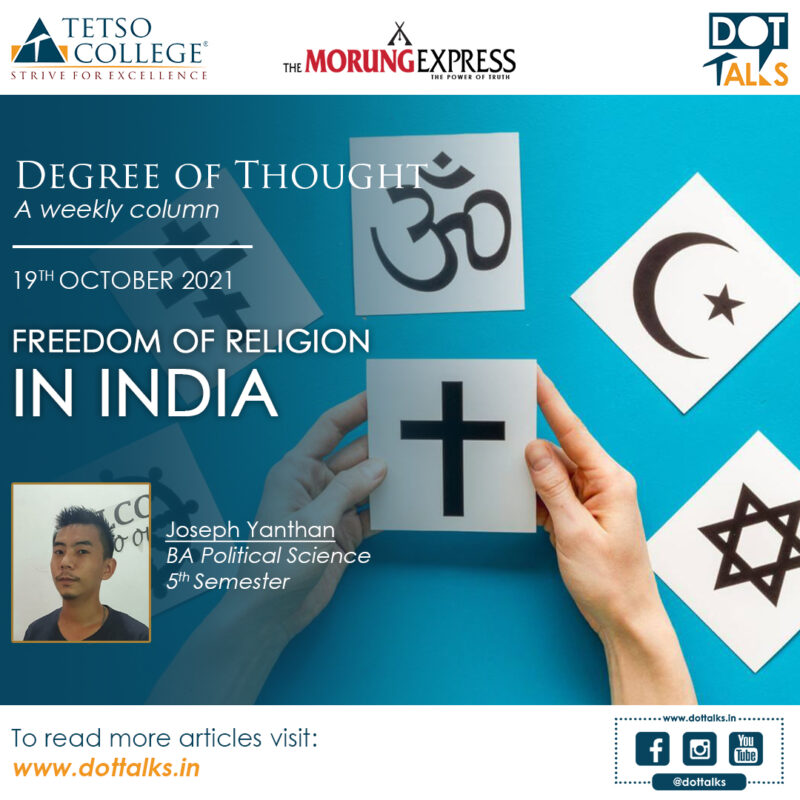 India is a nation of many religions and freedom of religion has been accorded constitutional protection. India is a secular state where there is no official religion followed. It is worthy to note that by 42nd amendment, 1976 of the Indian Constitution, the term ‘Secular’ was inserted in our Preamble which is nothing but a reflection of the ‘nature’ and ‘culture’ of this land.
India is a nation of many religions and freedom of religion has been accorded constitutional protection. India is a secular state where there is no official religion followed. It is worthy to note that by 42nd amendment, 1976 of the Indian Constitution, the term ‘Secular’ was inserted in our Preamble which is nothing but a reflection of the ‘nature’ and ‘culture’ of this land.
Freedom of Religion in India
“India has a great heritage and it is a model for religious harmony where people of different religions live peacefully and in harmony.”
Religion is a particular system of faith and belief concerning the cause and the purpose of the world in India. Most popularly acknowledged as the land of spiritual beliefs, philosophical thinking and culture. People in India have a strong faith and dependence when it comes to religion as they perceive that religion adds meaning and reason to their lives. Common religions of India are: the Hindu, Muslim, Christian, Buddhists, Jains etc. Each religion has its own concept and belief in God as well as a different lifestyle as guided by the religious leadership and scriptures.
When it comes to people who are greatly dedicated to their religion, they leave no stone unturned in showing a significant amount of fidelity towards their respective religion. We can clearly observe that every person has a distinctive lifestyle with their own interest, activities, opinion and attitude. Even the way of living, dressing style, food and custom it carries themselves and their outer appearance also form the essential part of the lifestyle. When it comes to the concept of religion many of the people have their own thoughts and their own way and different ways to celebrate religion where people worship God in their own ways.
Each citizen of India has a right to practice and promote their own religion peacefully. We have the fundamental right in the Indian constitution that is guaranteed by Article 25-28 (Freedom of Religion). India is considered a secular country and is called the land of diversity. Mostly, Hindu religion is majority followed by the Islam/Muslim, Christianity, Sikhism, Buddhism and others. Religious liberty is the foundation for the liberty of an individual or community, in public or private, to exhibit religion or belief in teaching, practice, worship and adherence to the ideology.
The Constitution of India Article 25 guarantees freedom of religion to all persons in India. It provides that all persons in India, subject to public order, morality, health, and other provisions, are equally entitled to freedom of conscience and have the right to freely professional practice and propagate religion. Article 26 provides the freedom to manage religious affairs. Article 27 of the Indian Constitution allows freedom to payment of taxes for promotion of any particular religion. Lastly, “Article 28 provides the Indian Constitution the freedom to attend religious instructions or religious worship in certain education institutions”.
On the basis of human rights, Article 21 clearly says that no person shall be deprived of his life or personal liberty except according to procedure established by law. With this Article, it supports us strongly and firmly supports the freedom to convey our opinion regardless of differences.
The Partition of India in 1947 led to the deportation of Hindus and Muslims on religious basis. Here, the British Empire played an important role that split the once contiguous nation which is called today now as Republic of India and Islamic Republic of Pakistan and Bangladesh. The partition was part of the end of British rule over the Indian subcontinent, British Raj. Syed Ahmed khan presented The Two-Nation Theory because it culminated to religious conflicts and Pakistan became a Muslim country and India a secular country. Muhammad Ali Jinnah was the main spokesman and led the partition where he became the first Governor-General of Pakistan. It affected around 10 to 20 million people along religious lines creating an overwhelming refugee crisis in the newly constituted domination. The partition of India can be considered as the greatest tragedy that the world has witnessed which happened on religious lines.
Right to Freedom to Religion comes under Article 25-28. Through this Article of the Indian Constitution, the Fundamental Rights help the minority population to claim rights, to raise voice for religious freedom. The Constitution of India clearly provides that every individual has the right to practice and propagate the religion of his /her choice. There is no law on or about religion or religious belief that says that we have to follow only one religion but in fact, all religions and faiths are entitled to get equal protection of the law under the Constitution of India.
Degree of Thought is a weekly community column initiated by Tetso College in partnership with The Morung Express. Degree of Thought will delve into the social, cultural, political and educational issues around us. The views expressed here do not reflect the opinion of the institution. Tetso College is a NAAC Accredited UGC recognised Commerce and Arts College. The editors are Dr Hewasa Lorin, Dr. Aniruddha Babar, Aienla A, Rinsit B Sareo, Meren Lemtur and Kvulo Lorin.
For feedback or comments please email: dot@tetsocollege.org

